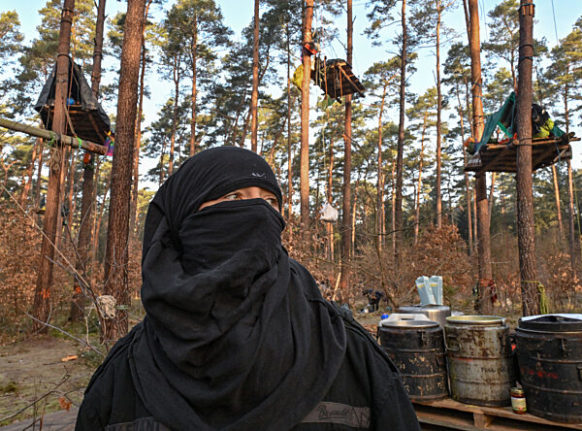About 80 activists from the “Stop Tesla” initiative built tree houses on a 120-hectare site, which is to be cleared for the expansion of Tesla’s Gigafactory. They cited the protection of water resources as their primary concern.
According to DPA, the activists erected about a dozen tree houses in the pine forest that is planned to be felled for the expansion of the Tesla factory. With large ropes, the wooden constructions were attached at different heights.
Activists from the Robin Wood alliance are on site and, under the motto “Forest instead of monster factory”, have attached a wooden platform in one of the treetops on which climbers can linger.
They are calling on Tesla, as well as municipal, state and federal government actors to do everything they can to stop the expansion and advance a climate-friendly mobility transition.
READ ALSO: Tesla’s German factory suspends production over Red Sea delays
The activists have announced that the occupation near the Fangschleuse train station is planned for an indefinite period of time. A field kitchen has been set up, signs point to the occupied area. More and more people are arriving in the forest with backpacks, according to the reporter.
Thursday morning the atmosphere on-site was peaceful after a frosty night. The police are on site and talking to the activists.
Squatters want to support local residents against Tesla
With the occupation of the forest, the initiative also wants to support the citizens of Grünheide, who voted against Tesla’s expansion plan in a residents’ survey.
“Our main concern is protecting drinking water in the area,” activist Caro Weber told DPA. According to her, environmental activists came from all over Germany.
The initiative does not trust that politicians will follow the will of the residents, as the existing plant has already been built with special permits, said Weber. Part of the Tesla site is located in a so-called ‘drinking water protection area.’
What does Tesla want to build on the expanded space?
The electric car manufacturer wants to build a freight station, warehouses and a company kindergarten in addition to the 300-hectare existing factory site. More than 100 hectares of forest are to be cleared for this purpose.
Conservationists and citizens’ initiatives, among others, are against enlargement. Tesla sees benefits for the region if the development plan eventually passes. Freight traffic could be relieved with the depot.
The company’s expansion plans for the car factory were rejected by the majority of the citizens of Grünheide. Almost two-thirds voted against the plans last week.
The vote is not legally binding, but is considered an important milestone. The municipal council still has to approve a development plan. Critics called for it to be changed, seeing no reason to expand the site.
According to Mayor Arne Christiani, the municipal representatives will not oppose the vote of the citizens.




 Please whitelist us to continue reading.
Please whitelist us to continue reading.
Member comments